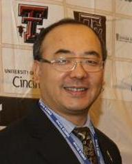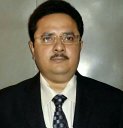 cipae@iecscience.org
cipae@iecscience.org Contact
Now :+17206234860
Contact
Now :+17206234860

Keynote Speakers
Keynote Speakers
|
Dr. Yongsheng Ma is a full professor at the University of Alberta where he joined since 2007. Dr. Ma is also a member of ASEE, SME, SPE, CSME and an Alberta registered Professional Engineer (P.Eng.). His main research areas include feature-based engineering informatics for design and manufacturing, CADCAM, and product lifecycle management. Dr. Ma received his B.Eng. from Tsinghua University, Beijing (1986), both M.Sc. (1990) and Ph.D. (1994) from UMIST, UK. In 2000-2007, he was an associate professor with Nanyang Technological University, Singapore. Dr. Ma started his career as a polytechnic lecturer in Singapore (1993); and then a senior research fellow and group manager (1996-2000) at Singapore Institute of Manufacturing Technology. Dr. Ma has published more than 200 internationally recognized top journal and conference papers, and book chapters. Dr. Ma had been an associate editor of IEEE Transaction of Automation Science and Engineering (2009-2013). In 2012, he won the prestigious ASTech award sponsored by The Alberta Science and Technology Leadership Foundation together with Drader Manufacturing Ltd. Since 2012, he has served as an editor of Advanced Engineering Informatics. Dr. Ma had been engaged for collaboration with many academic institutions and industrial partners internationally. 2019.09-2020.08, Dr. Ma was a visiting professor of SUSTech (China).
Title: Gamification and Predictive Analytics for the Next Generation of Workers
Abstract: The implementation of psychological theories in the study of gamification has played an important role in our digital lives as multiple social media and gaming apps compete to harness user engagement to stay popular and relevant. A review of psychological theories that induce extrinsic and intrinsic motivations in the workplace, as well as the current applications of game elements in a non-gamified environment, is done in this report. Following that, an improved gamified model is proposed that uses real time data, Weibull statistical distribution and a k-means clustering algorithm along with a reward system that would help increase skill development and retention along with employee satisfaction.
Dr. Siddhartha Bhattacharyya did his Bachelors in Physics, Bachelors in Optics and Optoelectronics and Masters in Optics and Optoelectronics from University of Calcutta, India in 1995, 1998 and 2000 respectively. He completed PhD in Computer Science and Engineering from Jadavpur University, India in 2008. He is the recipient of the University Gold Medal from the University of Calcutta for his Masters. He is the recipient of several coveted awards including the Distinguished HoD Award and Distinguished Professor Award conferred by Computer Society of India, Mumbai Chapter, India in 2017, the Honorary Doctorate Award (D. Litt.) from The University of South America and the South East Asian Regional Computing Confederation (SEARCC) International Digital Award ICT Educator of the Year in 2017. He has been appointed as the ACM Distinguished Speaker for the tenure 2018-2020. He has been inducted into the People of ACM hall of fame by ACM, USA in 2020.
He is currently serving as a Professor in the Department of Computer Science and Engineering of Christ University, Bangalore. He served as the Principal of RCC Institute of Information Technology, Kolkata, India during 2017-2019. He has also served as a Senior Research Scientist in the Faculty of Electrical Engineering and Computer Science of VSB Technical University of Ostrava, Czech Republic (2018-2019). Prior to this, he was the Professor of Information Technology of RCC Institute of Information Technology, Kolkata, India. He served as the Head of the Department from March, 2014 to December, 2016. Prior to this, he was an Associate Professor of Information Technology of RCC Institute of Information Technology, Kolkata, India from 2011-2014. Before that, he served as an Assistant Professor in Computer Science and Information Technology of University Institute of Technology, The University of Burdwan, India from 2005-2011. He was a Lecturer in Information Technology of Kalyani Government Engineering College, India during 2001-2005. He is a co-author of 5 books and the co-editor of 56 books and has more than 300 research publications in international journals and conference proceedings to his credit. He has got two PCTs to his credit. He has been the member of the organizing and technical program committees of several national and international conferences. He is the founding Chair of ICCICN 2014, ICRCICN (2015, 2016, 2017, 2018), ISSIP (2017, 2018) (Kolkata, India). He was the General Chair of several international conferences like WCNSSP 2016 (Chiang Mai, Thailand), ICACCP (2017, 2019) (Sikkim, India) and (ICICC 2018 (New Delhi, India) and ICICC 2019 (Ostrava, Czech Republic).
He is the Associate Editor of several reputed journals including Applied Soft Computing, IEEE Access, Evolutionary Intelligence and IET Quantum Communications. He is the editor of International Journal of Pattern Recognition Research and the founding Editor in Chief of International Journal of Hybrid Intelligence, Inderscience. He has guest edited several issues with several international journals. He is serving as the Series Editor of IGI Global Book Series Advances in Information Quality and Management (AIQM), De Gruyter Book Series Frontiers in Computational Intelligence (FCI), CRC Press Book Series(s) Computational Intelligence and Applications & Quantum Machine Intelligence, Wiley Book Series Intelligent Signal and Data Processing, Elsevier Book Series Hybrid Computational Intelligence for Pattern Analysis and Understanding and Springer Tracts on Human Centered Computing.
His research interests include hybrid intelligence, pattern recognition, multimedia data processing, social networks and quantum computing.
Dr. Bhattacharyya is a life fellow of Optical Society of India (OSI), India, life fellow of International Society of Research and Development (ISRD), UK, a fellow of Institution of Engineering and Technology, UK, a fellow of Institute of Electronics and Telecommunication Engineers (IETE), India and a fellow of Institution of Engineers (IEI), India. He is also a senior member of Institute of Electrical and Electronics Engineers (IEEE), USA, International Institute of Engineering and Technology (IETI), Hong Kong and Association for Computing Machinery (ACM), USA. He is a life member of Cryptology Research Society of India (CRSI), Computer Society of India (CSI), Indian Society for Technical Education (ISTE), Indian Unit for Pattern Recognition and Artificial Intelligence (IUPRAI), Center for Education Growth and Research (CEGR), Integrated Chambers of Commerce and Industry (ICCI), and Association of Leaders and Industries (ALI). He is a member of Institution of Engineering and Technology (IET), UK, International Rough Set Society, International Association for Engineers (IAENG), Hong Kong, Computer Science Teachers Association (CSTA), USA, International Association of Academicians, Scholars, Scientists and Engineers (IAASSE), USA, Institute of Doctors Engineers and Scientists (IDES), India, The International Society of Service Innovation Professionals (ISSIP) and The Society of Digital Information and Wireless Communications (SDIWC). He is also a certified Chartered Engineer of Institution of Engineers (IEI), India. He is on the Board of Directors of International Institute of Engineering and Technology (IETI), Hong Kong.
Title: Understanding Quantum Backpropagation
Abstract: Backpropagation techniques are widely used in neural networks for the purpose of weight adjustment and system error compensation. The lecture discusses the basics of the backpropagation algorithm with reference to a multilayer neural network. In addition, quantum backpropagation is introduced with reference to quantum mechanical principles. Applications of the quantum backpropagation technique are also demonstrated.
|
© Copyright 2020 International Conference on Computers, Information Processing and Advanced Education (CIPAE 2020)


